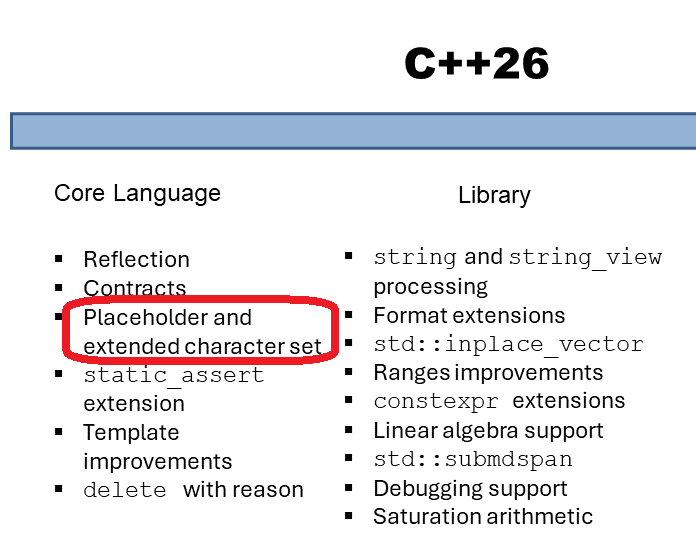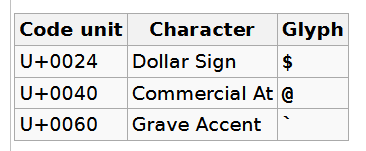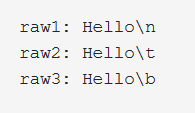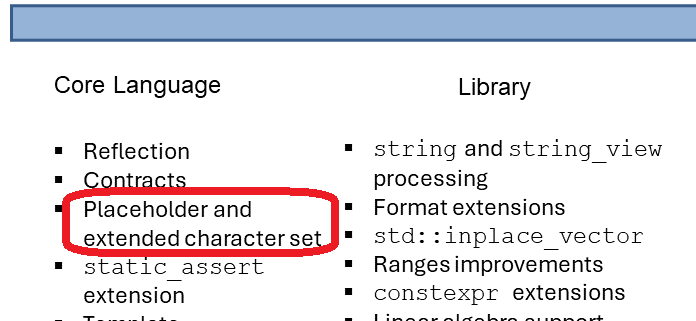Placeholders and Extended Character Set
Placeholders are a nice way to highlight variables that are no longer needed. Additionally, the character set of C++26 will be extended.

Placeholders
Structured bindings are a C++17 feature that allows you to bind multiple variables to the elements of a structured object.
The following program demonstrates using tuples and structured bindings to return and unpack multiple values from a function.
// placeholder1.cpp #include <tuple> #include <string> #include <iostream> // Function that returns three values std::tuple<int, std::string, double> getThreeValues() { int intValue = 42; std::string strValue = "example"; double doubleValue = 3.14; return std::make_tuple(intValue, strValue, doubleValue); } int main() { // Retrieve the three values using structured binding auto [intValue, strValue, doubleValue] = getThreeValues(); // Print the values std::cout << "Integer: " << intValue << '\n'; std::cout << "String: " << strValue << '\n'; std::cout << "Double: " << doubleValue << '\n'; }
The function getThreeValues is defined to return a tuple containing three different types of values: an int, a std::string, and a double. These values are then packed into a tuple using std::make_tuple and returned from the function.
In the main function, the program retrieves the three values returned by getThreeValues using structured bindings. Structured bindings allow the program to unpack the tuple directly into three separate variables: intValue, strValue, and doubleValue. This makes the code more readable and easier to work with than manually unpacking the tuple.
Sometimes, you don’t need all three values from the function getThreeValues.
// placeholder2.cpp #include <tuple> #include <string> #include <iostream> // Function that returns three values std::tuple<int, std::string, double> getThreeValues() { int intValue = 42; std::string strValue = "example"; double doubleValue = 3.14; return std::make_tuple(intValue, strValue, doubleValue); } int main() { // Retrieve the three values using structured binding auto [_, strValue, doubleValue] = getThreeValues(); // Print the values std::cout << "String: " << strValue << '\n'; std::cout << "Double: " << doubleValue << '\n'; }
This time, the intValue from the function getThreeValues is not needed in the subsequent code. By convention, I bind it to the underline.
At the same time, this means that the compiler does not issue a warning because the variable _ is not used:
Unfortunately, the intuitive _ can only be used once as an identifier. This changes with C++26. Now, it can be used as often as required.
// placeholder3.cpp #include <tuple> #include <string> #include <iostream> // Function that returns three values std::tuple<int, std::string, double> getThreeValues() { int intValue = 42; std::string strValue = "example"; double doubleValue = 3.14; return std::make_tuple(intValue, strValue, doubleValue); } int main() { // Retrieve the three values using structured binding auto [_, strValue, _] = getThreeValues(); // Print the values std::cout << "String: " << strValue << '\n'; }
In this variant, neither the intValue nor the doubleValue from the function getThreeValues is not required. I consistently use two underscores.

Extended Character Set
Three new characters are available in the basic character set:
 Modernes C++ Mentoring
Modernes C++ Mentoring
Do you want to stay informed: Subscribe.

The following program uses all three of them for raw string literals.
// extendedCharacterset.cpp #include <iostream> int main() { std::cout << '\n'; auto raw1 = R"@(Hello\n)@"; auto raw2 = R"$(Hello\t)$"; auto raw3 = R"`(Hello\b)`"; std::cout << "raw1: " << raw1 << '\n'; std::cout << "raw2: " << raw2 << '\n'; std::cout << "raw3: " << raw3 << '\n'; std::cout << '\n'; }
The program then defines three raw string literals: raw1, raw2, and raw3. Raw string literals in C++ are enclosed in R"delimiter(...)delimiter", where delimiter can be any sequence of characters. This allows the string to contain special characters like \n, \t, and \b without needing to escape them.
raw1is defined asR"@(Hello\n)@", which contains the textHello\nwithout interpreting\nas a newline character.raw2is defined asR"$(Hello\t)$“, which contains the textHello\twithout interpreting\tas a tab character.raw3is defined asR"`(Hello\b)`", which contains the textHello\bwithout interpreting\bas a backspace character.
Finally, here’s the output of the program:

What’s next?
The core language of C++26 still offers improvements, such as pack indexing. I will write about this in the next blog post.
Thanks a lot to my Patreon Supporters: Matt Braun, Roman Postanciuc, Tobias Zindl, G Prvulovic, Reinhold Dröge, Abernitzke, Frank Grimm, Sakib, Broeserl, António Pina, Sergey Agafyin, Андрей Бурмистров, Jake, GS, Lawton Shoemake, Jozo Leko, John Breland, Venkat Nandam, Jose Francisco, Douglas Tinkham, Kuchlong Kuchlong, Robert Blanch, Truels Wissneth, Mario Luoni, Friedrich Huber, lennonli, Pramod Tikare Muralidhara, Peter Ware, Daniel Hufschläger, Alessandro Pezzato, Bob Perry, Satish Vangipuram, Andi Ireland, Richard Ohnemus, Michael Dunsky, Leo Goodstadt, John Wiederhirn, Yacob Cohen-Arazi, Florian Tischler, Robin Furness, Michael Young, Holger Detering, Bernd Mühlhaus, Stephen Kelley, Kyle Dean, Tusar Palauri, Juan Dent, George Liao, Daniel Ceperley, Jon T Hess, Stephen Totten, Wolfgang Fütterer, Matthias Grün, Ben Atakora, Ann Shatoff, Rob North, Bhavith C Achar, Marco Parri Empoli, Philipp Lenk, Charles-Jianye Chen, Keith Jeffery, Matt Godbolt, Honey Sukesan, bruce_lee_wayne, Silviu Ardelean, schnapper79, Seeker, and Sundareswaran Senthilvel.
Thanks, in particular, to Jon Hess, Lakshman, Christian Wittenhorst, Sherhy Pyton, Dendi Suhubdy, Sudhakar Belagurusamy, Richard Sargeant, Rusty Fleming, John Nebel, Mipko, Alicja Kaminska, Slavko Radman, and David Poole.
| My special thanks to Embarcadero |  |
| My special thanks to PVS-Studio |  |
| My special thanks to Tipi.build |  |
| My special thanks to Take Up Code |  |
| My special thanks to SHAVEDYAKS |  |
Modernes C++ GmbH
Modernes C++ Mentoring (English)
Rainer Grimm
Yalovastraße 20
72108 Rottenburg
Mail: schulung@ModernesCpp.de
Mentoring: www.ModernesCpp.org




